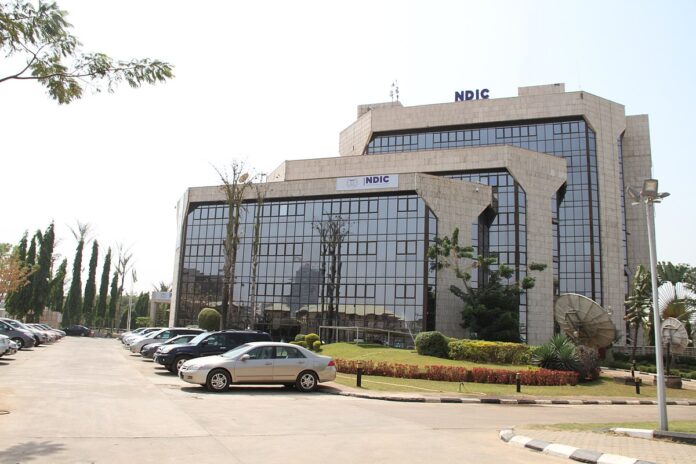By Chris Ndibe
Nigeria Deposit Insurance Corporation (NDIC) says it adhered to statutory guidelines on the resolution and liquidation of Fortis Microfinance Bank (MFB) and the protection of interest of depositors.
The corporation said this in a statement by Dr Sunday Oluyemi, its Director, Communication and Publication Affairs.
According to the NDIC, the initial efforts by regulatory authorities involved the setting up of joint CBN/NDIC Interim Management Committee (IMC) to manage the affairs of the bank toward stemming the tide of its mismanagement.
It said its initial efforts also included the protection of the interest of its depositors.
“The intervention by the IMC also included the payment of N2 billion released to it by the Committee of Governors of CBN to the bank’s depositors in order to ease the hardship being experienced by them,” the corporation said.
NDIC said the facts and figures behind the liquidation of the bank showed that its fortune began to decline due to mismanagement and abysmal corporate governance practices, making the CBN, in collaboration with the NDIC, to take several actions to address the bank’s deteriorating financial condition.
He said that the intervention of regulatory agencies in the resolution of the defunct Fortis MFB were in two phases.
“The first phase involved corrective and supervisory measures which eventually included the sacking of the Executive Management, dissolving the Board of Directors and the appointment of a joint CBN/NDIC Interim Management Committee (IMC) to temporarily manage the affairs of the MFB.
“One of the reasons for the setting up of the IMC, among others, was the need to protect the interests of the depositors.
“The second phase involved the revocation of the operating licence of Fortis MFB by the CBN and its subsequent liquidation by the NDIC.
“Unfortunately, when all the regulatory/supervisory efforts to turn around the fortunes of Fortis MFB failed to yield the desired results, the CBN was left with no other option than to revoke its operating licence in December, 2018.
“As soon as Fortis MFB’s operating licence was withdrawn, the NDIC in line with its mandate, swiftly verified the defunct MFB’s depositors and commenced payment of the insured sums up to the maximum limit, ” the corporation added.
According to it, the liquidation of Fortis MFB is ongoing and the corporation is making all necessary efforts to realise the failed MFB’s any residual assets which include bad loans and physical assets.
This, the corporation noted, was to enable the NDIC pay depositors with funds in excess of the insured limits.
“The payment will be in form of liquidation dividends as has been the case with many closed banks currently under liquidation.
“We like to assure the general public that the corporation is intensifying efforts to ensure that the residual assets of the Fortis MFB in-liquidation are realised with a view to paying the MFB’s uninsured depositors.
“It is on record that through its sustained and diligent liquidation activities, the NDIC has realised assets to pay in full the deposits of the customers of 19 banks previously liquidated.
“The depositors of the affected closed banks who filled their claims have been paid all their deposits.”
The NDIC said that it had not failed concerning complaint by a business businesswoman, Mrs Uju Ohanenye, who accused the corporation of failure to pay the balance of N222.4 milllion out of the fixed deposit of N301 million she lodged with Fortis Microfinance Bank.
“Under normal circumstances, the corporation does not join issues with depositors of failed financial institutions in public for obvious reasons.
“But because Mrs Ohanenye has already made the details of her reported petition public, coupled with the fact that the same report is capable of misleading millions of innocent Nigerians, particularly on the scope, benefits and limitations of the Deposit Insurance System (DIS) in Nigeria, the NDIC is constrained to issue this statement.
“Mrs Ohanenye had contacted the Corporation on several occasions where all the issues involved in the matter were painstakingly explained to her.
“Contrary to her insinuation and accusation that the Corporation allowed Fortis MFB’s management to defraud customers and had been negligent in the discharge of its duties, the NDIC, therefore, made clarifications on how the businesswoman was paid.
“Mrs Ohanenye approached the Fortis MFB’s IMC and was paid a total of N74,703,867.65 (Seventy-Four Million, Seven Hundred and Three Thousand, Eight Hundred and Sixty-Seven Naira, Sixty-Five Kobo Only) only in two tranches of N18,000,000:00 (Eighteen Million Naira Only) and N56,703,867.65 (Fifty-Six Million, Seven Hundred and Three Thousand, Eight Hundred and Sixty-Seven Naira, Sixty-Five Kobo Only), respectively.
“While the first tranche was for the treatment of her ailing husband, the second tranche was paid from the N2 billion approved for the IMC by the CBN in order to ease the hardship experienced by depositors.
“Subsequently, Mrs Ohanenye was paid another sum of N200,000 (Two Hundred Thousand Naira Only) which she was entitled to after the liquidation of Fortis Microfinance Bank (MFB) Plc.
“It is essential for Mrs Ohanenye and other depositors to be properly advised that microfinance banks were established to provide affordable banking services to the economically “active poor”, that is, the low income individuals and enterprises as a way of promoting financial inclusion.”




